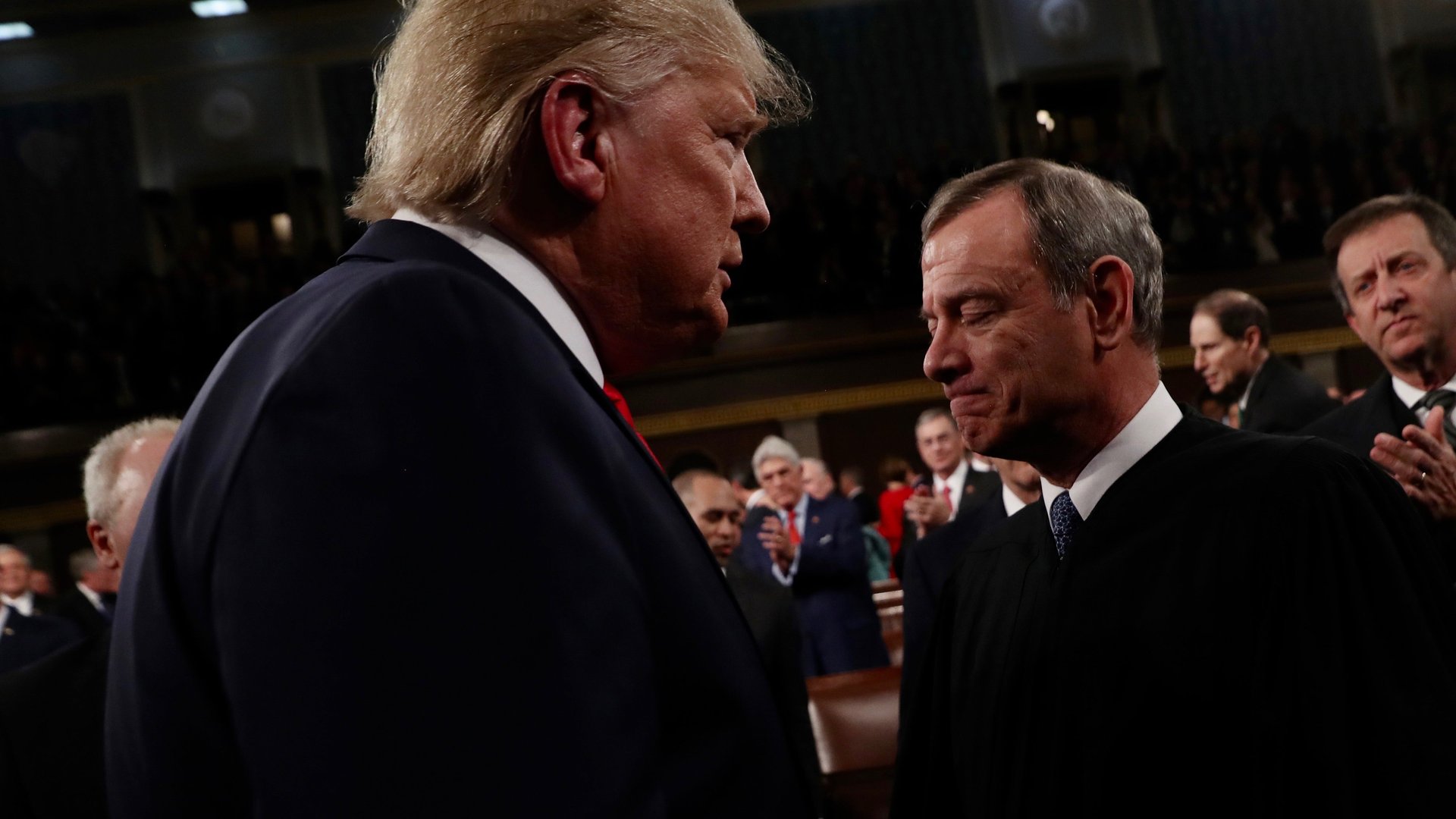SCOTUS chief John Roberts seems exhausted by Trump
US Supreme Court chief justice John Roberts is one dutiful jurist.


US Supreme Court chief justice John Roberts is one dutiful jurist.
He showed up at the president’s State of the Union address last night after two grueling weeks of long hours presiding over Donald Trump’s Senate impeachment trial, looking very tired and offering his now-familiar strained smiles.
Perhaps it was the schedule, not the president per se, who pained the chief. But Roberts certainly seemed uncomfortable and impatient when he listened to the executive accused of constitutional offenses speaking. He stole glances at his watch, tapped his foot, gazed sideways and up at the press gallery occasionally, and rubbed his eyes, almost as if brushing away tears.
Sure, they could have been tears of sheer physical exhaustion. Roberts did just celebrate his 65th birthday last week and he’s not used to the rock n’roll hours senators have kept during impeachment proceedings. The high court is much more civilized—hearings begin at 10 am and rarely roll past noon, unlike the president’s trial, which sometimes began at midday and went into the wee hours of the morning.
Or, the chief may have been just a little bit sad about the state of the union, especially when Trump trumpeted his political judiciary-packing project, which gives the very impression Roberts doesn’t want Americans to have. The president explained he’s appointing as many originalist judges as possible, though the chief justice has taken continual pains to impress upon Americans that judges don’t operate as Democrats or Republicans but are impartial arbiters, and emphasizes that courts are not political spaces.
“With every action, my administration is restoring the rule of law and re-asserting the culture of freedom,” said the president accused of flouting the law and asserting his freedom unconstitutionally. “Working with Senate majority leader Mitch McConnell and his colleagues in the Senate, we have confirmed a record number of 187 federal judges to uphold our Constitution as written.”
The president wasn’t lying. He and McConnell are on fire when it comes to appointing judges. However, Roberts has tried to offer a kindler, gentler, more just view of his branch of government. He has even indirectly chided Trump publicly for suggesting that there are “Obama judges” or “Trump judges.” So Trump’s boasting had to grate on Roberts, whose considerable patience has already been thoroughly tried by “pettifogging” senators at the president’s impeachment trial.
However, not even the chief justice could begrudge his most junior justices their inevitable moment in the sun. When Trump pointed out the two primary successes in his judicial project—Neil Gorsuch and Brett Kavanaugh, his Supreme Court appointees—the chief finally smiled seemingly sincerely.
Roberts was accompanied to the annual presidential address by only three of the eight other justices—Elena Kagan, Gorsuch, and Kavanaugh—who all followed the chief’s lead. If he rose and clapped, they did too. If he remained seated, the associate justices didn’t budge either. They refrained from almost all expressions except those Roberts modeled.
They stood for sweet tales of kids getting scholarships and military families reunited. They sat during presidential policy boasts that had Republicans hooting and hollering. All appeared slightly worried, brows furrowing, when Trump proclaimed that terrorists “will never escape American justice,” by which he meant death.
And all tried to seem unmoved when the president promised Americans he would defend their Second Amendment right to bear arms—this proved too difficult for Kavanaugh, however, who apparently could not help smiling slightly, approving this mission. A guest in the gallery overlooking the floor was much less subtle and in no way approved the promise, shouting, “What about gun victims?” He was quickly ejected by House security for this infraction (Kavanaugh’s flouting of his boss’s rules appeared to go unnoticed though).
When Trump’s speech was over, he shook Roberts’ hand, as he had when first entering the House chamber. The chief justice returned the handshake, quickly and gravely, not even offering the president the pained smile and polite chatter he’d afforded him earlier. Kagan also acknowledged the president perfunctorily, while Kavanaugh and Gorsuch grinned and were much more effusive.
The boss was over it. Roberts had another appointment at the Capitol just ahead and even more politicking to manage. He hustled the justices out the door.
The chief justice will preside over the expected acquittal of the president in the Senate today.